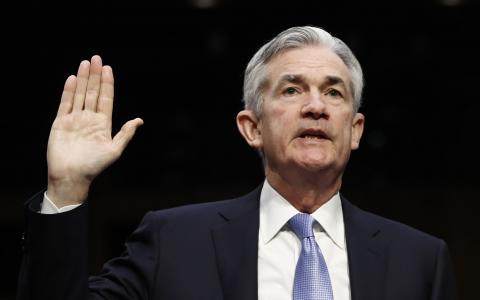
(MarketWatch) The Dow Jones Industrial Average is fresh off ringing up its ninth all-time high of 2019 but further records for the market may hinge on Wednesday remarks by Federal Reserve Chairman Jerome Powell, which come a day after an eagerly awaited speech by President Donald Trump.
Speaking at the Economic Club of New York on Tuesday, Trump said in his speech that his administration had “exceeded expectations” on the U.S. economy — creating nearly 7 million new jobs — and repeated his charge that the Fed has cut interest rates too slowly.
Trump claimed, “if we had a Fed that worked with us, we could have added another 25% to those numbers,” referring to potential gains to major stock benchmarks.
The president also mentioned international relations during the speech but held off on making any concrete declarations about the outlook for the current phase of talks between major counterparts, including China. Trump, however, did say that Beijing was “dying to make a deal.” But the president offered no details on when or if tariffs would be phased nor did he provide a place or time for a meeting to sign a deal with Chinese President Xi Jinping.
Recent reports also suggest that the president will delay imposing import levies for six months on European auto imports, however he made no mention of this specifically during the speech. The deadline for a decision is Wednesday, and it has already been postponed once before, in May.
Trade developments have been a central driver for markets in recent months, with progress toward a so-called phase one deal between Beijing and Washington helping to set the stage for the the S&P 500 indexand the Nasdaq Composite Index to resume a fresh assault on records.
Perhaps more than other U.S. presidents, Trump has hitched his success to gains in the stock market and to the health of the U.S. economy:
However, uncertainty on the substance of the a Sino-American agreement and conflicting reports on the roll back of tariffs as a part of a resolution has injected a degree of uncertainty in markets in recent trade. Last week, the Chinese Ministry of Commerce said that both parties had agreed to phase out recent tariffs as part of the elements toward completing a partial tariff deal but that report was soon followed by reports that trade officials within the Trump administration weren’t in agreement.
“Ultimately, his scripted remarks were similar to campaign stump speeches he’s given in the past, but in more detail and with a slightly more data-driven and economic-tilt that befits the audience he was speaking to,” wrote Chris Zaccarelli, chief investment officer for Independent Advisor Alliance, in emailed comments.
“What was missing were details about progress on phase one of the trade deal with China or the status of auto tariffs which may be placed on imports from the European Union,” he wrote. “He mentioned that the “China deal could happen soon,” but he’s said exactly the same thing in the past, so that wasn’t anything new,” he said.
Meanwhile, Powell at 11 a.m. Eastern Time will testify in front of the Joint Economic Committee, which is headed by Sen. Mike Lee, a Utah Republican. On Thursday at 10 a.m., Powell will speak to the House Committee on the Budget.
The testimony would come after the Federal Open Market Committee last month delivered its third consecutive rate cut in as many meetings of the rate-setting body. The 10-year Treasury note and the U.S. dollar could be assets that prove the most sensitive. Yields can drive or deflate demand for bonds and by extension the dollar.



